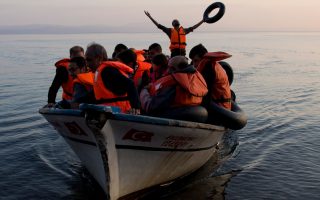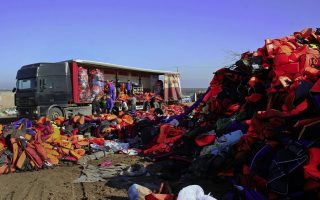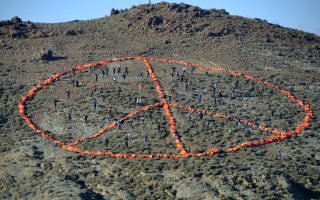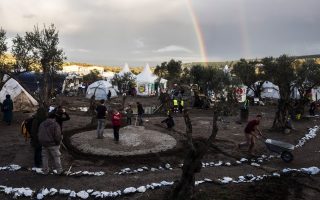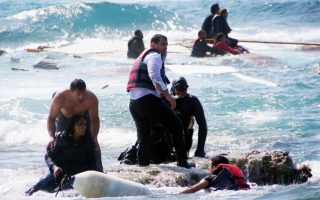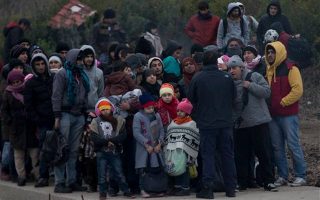‘We know what it means to be a refugee,’ say Lesvos grandmothers
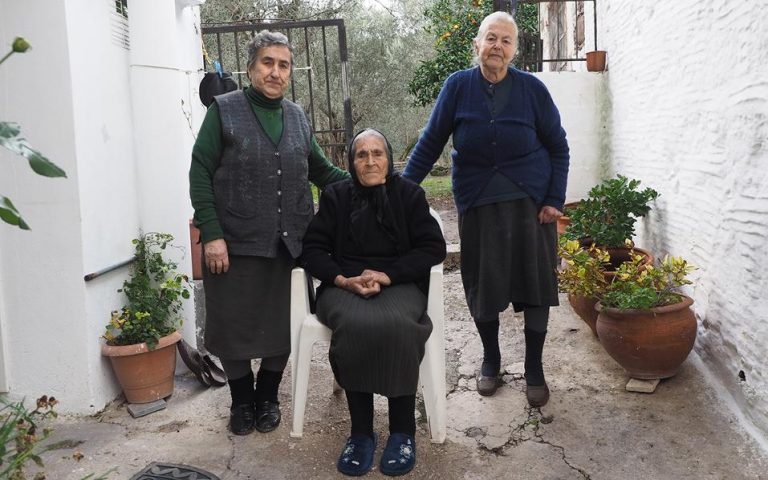

By YIANNIS PAPADOPOULOS, Photographs: ENRI CANAJ
Even as the high winds whip up the sea they still come. I spot two black dots far away on the horizon: rubber dinghies that have set off from the Turkish coast, overladen with men, women and children.
If she could, 85-year-old Maritsa Mavrapidi would walk down the road from her front gate to the beach of Skala Sykamias and wait – as she has done so many times in the past – for the boats to land. After all, she knows exactly what it means to be refugee.
“Our mothers came here as refugees from Turkey, just across the way, and they were just girls at the time. They came without clothes, with nothing,” she says. “That’s why we feel sorry for the migrants.”

Maritsa Mavrapidi starts her day in the farm.
Maritsa prefers not to go out on cold days. Her cousins would also have liked to be at the beach to help the newcomers but they also avoid bad weather. Efstratia Mavrapidi is 89 and Militsa (Emilia) Kamvisi 83. The latter was recently nominated for a Nobel Peace Prize along with a Lesvos fisherman as representatives of the islanders who have taken the refugees into their hearts and their homes.
“Dear Lord, we never expected this: people coming through the storm,” says Maritsa. “As soon as they step off the boat they say prayers and kiss the ground; it’s unbelievable. They’re to be pitied. And there are so many babies, tiny little things. It breaks your heart to see the babies in such a sorry state, trembling with cold.”
I sit with the three women in Militsa’s home. The village’s olive grove starts at the back of the house and from the front there’s a view to the sea. “I’ve moved downstairs because I have volunteers who help the refugees staying upstairs,” she says.

From left to right: Eftratia Mavrapidi, Militsa Kamvisi, Maritsa Mavrapidi.
Among dozens of photographs of her children, grandchildren and great-grandchildren, I spot a framed newspaper clipping, with a photograph of the three: Militsa bottle-feeding a baby that had just come over from Turkey with its mother as Maritsa and Efstratia look on fondly.
This photograph, taken by Lefteris Partsalis last October, went around the world and brought unexpected publicity for the three women and their families. Militsa says that people came up to her son and congratulated him at a church in Naoussa in northern Greece at New Year’s. And Militsa still talks about how her grandson’s teacher showed the photograph to the class, while Efstratia remembers receiving dozens of phone calls from all over Europe.
The three share a lot more than this moment of fame. They share roots and a hard life. Their mothers arrived on Lesvos on fishing boats from Asia Minor in 1922. They are reminded every time they see refugees landing on the island’s shores of the scenes of exodus their mothers had described.
“My mother had three babies when she came from Turkey,” remembers Efstratia. “She had no clothes for the youngest and had to tear her underskirt to wrap it in.” Back in Turkey Militsas’s father had been engaged to a different woman. “He packed up his sewing machine and a trunk of clothes as they prepared to leave, but his fiancee and her mother were killed. He came to Lesvos alone and later met my mother.”
They know from the stories they were told that the islanders were not particularly welcoming to the new arrivals from Asia Minor. “The locals were scared that the refugees would settle here,” says Maritsa. “Eventually they did. They bought land and got married.” One of the places where many of the refugees put down roots was Skala Sykamias. Here, in this spot that was the birthplace of celebrated novelist Stratis Myrivilis, the refugees experienced poverty and suffering.
“They led very sad lives and had many children, like the migrants that coming today,” says Militsa.
“They made their homes in olive storage sheds. Four families could live in one room, separated by hanging carpets,” adds Efstratia.
Most of the refugee families, including those of Efstratia, Militsa and Maritsa, gradually acquired their own homes and worked cultivating olives, something that they passed down to the younger generations. “We were poor, just like our mothers,” says Maritsa.
Faced with tragedy
Time has left its mark on all the women: a hearing problem, trouble walking, deep wrinkles. Only one, the eldest, still wears a headscarf. All of them have suffered the toils of a farming life. “I was gathering olives right until the last minute before giving birth to all four of my children,” says Militsa, adding that after one the births, her husband asked her to return to the fields the following day.

“Tired? You have no idea. It was a battle: Picking olives all day then coming home at night to make bread, bake it, do the laundry by hand and then returning to the field the next morning,” says Efstratia.
Maritsa went to school but had to drop out in second grade to look after her younger brother when their mother was out in the fields. “I’ve been looking after children ever since,” she says.
Despite their toil, all three feel like they are having a “good dotage.” They laugh a lot when they get together and when the weather is fair they like to sit on a bench that looks out to sea. They have children, relatives and friends to look after them. In the time that I spent with them, three people dropped by to ask whether they were well and Militsa’s daughter brought her food. The pain they witness every day is their biggest source of sadness.
“You just depair when you see how many drown. It’s like you can’t breathe,” says Militsa, adding that she’s wary about switching on the television as she can’t face any more bad news.

Refugees and migrants arrive in Lesvos in January.
When the refugee boats started arriving at Skala, the three grandmothers, like many other islanders, donated clothing to the new arrivals. Other than the child in the famous photograph, Maritsa has cared for another two babies while volunteers looked for their parents. Over 500,000 refugees and migrants passed through Lesvos in the last year, most landing on its northern coast.
Eloquent gestures
“They were happy when they saw us and greeted us with so much love,” says Efstratia of the many refugees she has welcomed on the beach. She also remembers how doctors from the aid groups on the island rushed to her side when she fell one day and hurt her foot. One of Militsa’s most memorable moments was when a Syrian child offered her a piece of bread. And Maritsa remembers: “A small child tried to open my fist and I thought it wanted money. I said I didn’t have any. But then I realized that it wanted to hug me and kiss me. Maybe I reminded it of its grandmother.”
During most of these meetings on the beach, the women communicate with the refugees using hand gestures. Every so often they are joined by a friend who was born in Skala but had lived in Ohio, in the US, for 40 years and could speak to the refugees in English. With the mother of the child in the famous photograph, little needed to be said. They took care of her crying baby while she changed into dry clothes.
“These aren’t people who’ll do any harm. Let them come and maybe if they go abroad they will succeed and get a job,” says Maritsa.
“You don’t fear them because they’re people who want to talk,” adds Militsa. “Many kiss us on the forehead when they see us.”
Watch the video:
